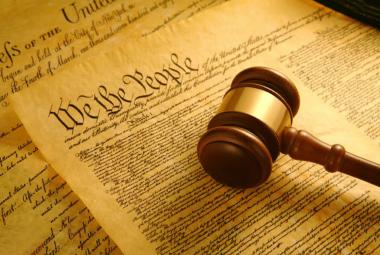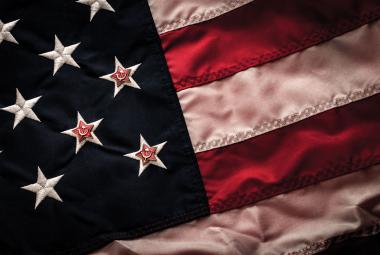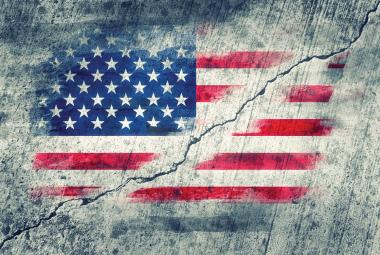There is a disturbing trend in today’s military to incrementally marginalize a soldier’s faith, particularly Christian faith. American military leaders didn’t always feel this way…
Apparently the former United States military’s policy of “don’t ask, don’t tell” has been replaced with a new one. In the modern world where people “despise good and love evil,”1 it is just fine for a soldier to celebrate a homosexual lifestyle, but another soldier could face disciplinary actions if he were to share his Christian faith.
On May 1, news sources reported that soldiers could be prosecuted for sharing that faith, up to and including court-martial. The Department of Defense later clarified their statement saying that that no troops or chaplains are being court-martialed for evangelism.
While explaining that evangelism is not a punishable offense, the DOD spokesman said that proselytizing is. To “proselytize,” defined as “to induce someone to convert to one’s faith,” would be considered a violation of the Uniform Code of Military Justice.
Defining “proselytizing” as a punishable offense has caused a great deal of concern and confusion among military chaplains and the troops. Any sort of coercive conversion to any religion is already a violation of the First Amendment, so why was this rule put in place? What is the distinction between “evangelizing” and “proselytizing”?
This latest directive seems to be part of a trend to incrementally marginalize a soldier’s faith, particularly Christian faith, from military life. Another example of this marginalization is the ongoing struggle for Christian chaplains to pray in public settings in the name of Jesus, which is the only way we can come before God the Father.
American military leaders didn’t always feel this way. Between 1941 and 1945, the American Bible Society printed and distributed six million New Testaments to men and women in the armed services. The books carried in the flyleaf letters from the commanding officers and officers of various military units. One of those commanders was the Commander in Chief of the Armed Forces, President Franklin Delano Roosevelt. In today’s new military, this letter could be construed as a violation of military policy.
God in the “Brother’s War”
During the American Civil War, Christ was very much a part of army life. In May 1864 in a letter to the Rev. Robert J. Harp, the Superintendent of the Southwestern Department Soldiers’ Tract Association, it was reported that,
The (Confederate) army was in the midst of a most extensive revival at the beginning of the month. Protracted meetings were being held in almost every brigade; thousands of our soldiers were thronging our rude camp altars, hundreds were giving their hearts to God, and scores were nightly asking for certificates of Church membership.
The report also stated that about 300 men and officers were baptized in one day alone, with over 2,000 being saved in one week. Many times, the only thing that stopped the church services were attacks by the Union Army. During these times, the Confederate troops “literally went from the altar to their entrenchments—from their knees to the battle with their foes—still singing the songs of Zion and supplicating the throne of grace as they surrounded the fires of the bivouac, or waited to receive the fire of the foe.”2
The Union (Northern) Army also found comfort in Christ on the battlefield. This is not to say that Christ was central to a typical soldier’s life during the entire conflict. In the early stages of the war, it seemed as if religion had been left at home. Many soldiers, away from home for the first time, were often tempted to “make some foolishness,” as one soldier put it. Believing Christians in the field were often confronted with profanity, gambling, drunkenness, sexual licentiousness, and petty thievery.
This attitude began to change as the true horror of the war began to sink in. After the decisive campaigns at Gettysburg, Vicksburg, and Chattanooga in 1863, revivals became a regular feature of Union army life. By this time, veteran soldiers began seeking support in religion.
In the Army of the Potomac, a great religious revival appeared during the winter of 1863–64. Numerous brigades erected churches and chapel tents for prayer meetings. General McAllister said he had never witnessed a better religious feeling among the men. And a reporter for a religious magazine thought the “piety of the Union army would win the whole nation to Christ.”3
The War of the “First July Fourth”
Some historians have argued that the American Revolutionary War was the defining moment in the history of American Christianity. During that period, Enlightenment ideas and evangelical Christian values combined to produce what sociologist Seymour Martin Lipset has called “the first new nation.”
The Revolutionary War was unique in modern history in that it was not over territory or spoil, it was a revolt to which republican and Biblical beliefs flowed together and influenced each other. During the Revolutionary period many of the emphases of the First Great Awakening were secularized and incorporated into the fabric of the new nation. During this period in America, Protestant ministers preached that God had chosen America for a special purpose.
This ethos of striving to maintain God’s favor on the colonial war effort became a central part of the Continental Army’s life. Putting God first, even in war, became a central precept for General George Washington, the Commander in Chief of the Continental Army. On July 9, 1776, Washington issued an order from his headquarters in New York to appoint chaplains to every regiment. In the order, he wrote:
… The General hopes and trusts, that every officer and man will endeavour so to live, and act, as becomes a Christian Soldier, defending the dearest Rights and Liberties of his country.4
Even with this order, chaplains had one of the most demanding jobs in the Continental Army. Historian Charles Royster, professor of history at Louisiana State University had written that “… profanity, drunkenness, neglect of the Sabbath, and disrespect for the clergy were widespread among Continental soldiers.” This contrasted sharply with the high moral ground upon which the war was being fought, and Christian Revolutionaries deplored the contrast.5
Other Revolutionary War generals also believed that religious devotion was an essential element toward good discipline and enlisted the chaplains to help them in their efforts to foster unit cohesion. Unit commanders required soldiers to attend church services. One punishment for absence was digging up stumps.
The Key to Military Success
Washington himself believed that not only was religious devotion a key to military discipline; he also believed that it was the key to the success of their endeavor. In Valley Forge, despite their hunger and the lack of adequate clothing, Washington ordered all able-bodied men who were not on duty to participate in worship services. He and his officers also attended these services. This was one of Washington’s written prayers during the winter at Valley Forge:
Almighty God, and most merciful Father, who didst command the children of Israel to offer a daily sacrifice to Thee, that thereby they might glorify and praise Thee for Thy protection both night and day; receive, O Lord, my morning sacrifice which I now offer up to Thee. I beseech Thee, my sins, remove them from Thy presence, as far as the east is from the west, and accept of me for the merits of Thy Son, Jesus Christ, that when I come into Thy temple, and compass Thine altar, my prayers may come before Thee as incense; and as Thou wouldst hear me calling upon Thee in Thy Word, that it may be wisdom, righteousness, reconciliation and peace to the saving of my Soul in the day of the Lord Jesus.6
Congress also understood the importance of giving God His proper place in the conflict. On May 8, 1778, Congress ordered all ministers to read an assessment of the war from their pulpits. The letter repeated references to the Almighty and their reliance on His protection. The paper read in part, “Our dependence was not upon man,” Congress asserted, “it was upon Him who hath commanded us to love our enemies, and to render good for evil”; our success has been “so peculiarly marked, almost by direct interposition of Providence, that not to feel and acknowledge His protection would be the height of impious gratitude.”7
They surviving sermons from this time indicated a fine line that chaplains had to tread. The had to preach sermons that would build the soldiers’ faith that their Cause was both winnable and right, and they had to foster courage in the face of both suffering and combat and encourage the good behavior that were the hallmarks of the upright Christian and disciplined soldier.
These two conflicting priorities sometimes put chaplains in a difficult position at times. On Thanksgiving Day, 1777, one Continental army unit, which had not been paid since August, heard a sermon where the chaplain prepared a text giving advice to soldiers using the words of John the Baptist. In the sermon, John was quoted as saying, “Do violence to no man, neither accuse any falsely …”8 The chaplain conveniently left off the rest of the verse, to which the soldiers happily finished, “And be content with your wages!”
That chaplains were such important part of military strategy was part and parcel of what differentiated the Continental army from the British. The Revolutionary command made sure that the Colonial soldiers knew what they were fighting for. “The fate of unborn millions will now depend, under God, on the Courage and Conduct of this Army,” wrote Washington. He also recognized that a soldier’s behavior mattered, not only to good military discipline, but to God Himself. On August 3, 1776, from his headquarters in New York, George Washington issued this General Order:
… The General is sorry to be informed that the foolish, and wicked practice, of profane cursing and swearing is growing into fashion; he hopes the officers will, by example, as well as influence, endeavour to check it, and that both they, and the men will reflect, that we can have little hopes of the blessing of Heaven on our Arms, if we insult it by our impiety, and folly …
Evidence of Divine Providence
Through the years of struggle, it did seem as if God’s Hand was truly on the Colonial Cause. The 16 months between July 1776 in New York and concluding in October 1777 at Saratoga include many examples of what many Americans would believe to be of Divine Providence. Among them were the night the ground expectedly froze between Trenton and Princeton allowing the Continental Army escape the annihilation British General Cornwallis had planned for it the following morning, and the time Washington himself survived a hail of bullets and cannon fire when he was caught between his own troops and the Redcoats at the Assunpink Creek Bridge during the second Battle of Trenton.
Casualties of War
One sad note to the Revolutionary War was that the military leader’s attention to enlisting God in the cause and in the soldier’s daily life did not seem to carry through into civilian life. In reality, the war had the opposite effect.
The issue of the Revolution itself had badly divided Americans, both inside and outside the churches. Opinion ranged from enthusiastic endorsement of the Revolution by most Congregationalists, Presbyterians and Baptists to non-participation on moral grounds by the Quakers, Mennonites and other Christian pacifists.
The conflict blunted the religious conscience of a generation of Americans and encouraged many to become apathetic toward Christianity.
The ebb and flow of this country’s faith in God seems to follow cyclical patterns. During times of prosperity there is a falling away from faith only to be brought back to God during times of crisis.
We need to follow the same advice Washington and other military leaders followed in 2 Chronicles 7:14 and “seek His face.”
That means all of us in “God’s army.”
Notes:
- 1. Micah 3:2.
- 2. Jones, J. W. (2010). Christ in the Camp, or Religion in Lee’s Army. Charleston, SC: Nabu Press.
- 3. Christianity Today. (1992). Christianity & the Civil War. Christian History Magazine, p. Issue 33.
- 4. Christianity Today. (1992). Christianity & the American Revolution. Christianity Today, p. Issue 50.
- 5. Royster, C. (1979). A Revolutionary People at War: The Continental Army and American Character, 1775–1783. Charlotte, NC: University of North Carolina.
- 6. LaHaye, T., & Lambert, F. (1987). Faith of Our Founding Fathers. Nashville: Wolgemuth & Hyatt.
- 7. James, H. H. (1998). Religion and the Founding of the American Republic. Washington, DC: Library of Congress.
- 8. Luke 3:14.
Further Study
- Chief of Chaplains. (1946). American Army Chaplaincy—A Brief History. New York: Harper & Row.
- Reid, D. G., Linder, R. D., Shelly, B. L., & Stout, H. S. (1990). Dictionary of Christianity in America. Downers Grove: InterVarsity Press.






